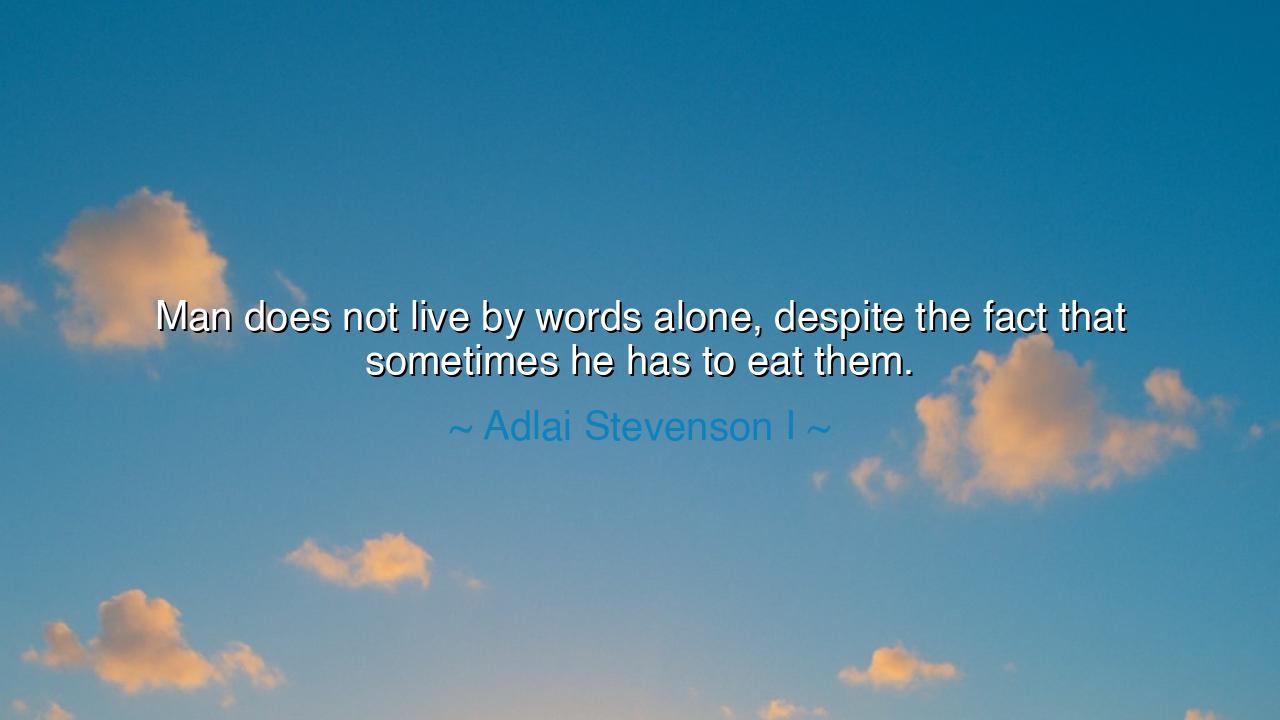
Man does not live by words alone, despite the fact that sometimes






“Man does not live by words alone, despite the fact that sometimes he has to eat them.” — so spoke Adlai Stevenson I, a man of wit and wisdom, whose tongue carried both reason and laughter. In this saying, he joins the long chorus of thinkers who have warned humanity that words are powerful, but not sufficient, that the world is not moved by speech alone but by the deeds that follow it. Yet Stevenson, with the keen humor of one who has known politics and pride, adds a twist of humility — for sometimes, when our words run ahead of our wisdom, we must “eat them”, swallowing our own boasts and follies. His quote, both playful and profound, is a meditation on the balance between speech and action, pride and humility, aspiration and reality.
The first half of his thought — “Man does not live by words alone” — echoes an older truth, born from the sacred texts of antiquity. It recalls the words of Christ in the wilderness: “Man shall not live by bread alone, but by every word that proceeds from the mouth of God.” Stevenson reverses the image with gentle irony, turning divine wisdom into worldly counsel. For in the realm of men, it is not divine words that sustain us, but the actions that make our words flesh. Words inspire, but deeds fulfill. A promise without practice is air. A creed without courage is dust. In this way, Stevenson reminds us that life, like character, is measured not by what one says, but by what one does when silence ends.
But the latter half — “despite the fact that sometimes he has to eat them” — pierces deeper still. For all who speak boldly will one day be humbled by their own tongue. It is the nature of pride to overreach, and the nature of life to correct it. To eat one’s words is to face the moment when conviction meets consequence, when we are forced to admit our error or to retract what once burned on our lips. Yet Stevenson does not frame this as tragedy. Instead, he offers it as wisdom wrapped in humor — for humility, too, is a kind of nourishment. The man who can laugh at his own folly, who can consume his mistaken words and rise wiser for it, has fed his soul with truth.
History offers many such feasts of humility. Consider Winston Churchill, whose early career was marked by failure and ridicule. He once declared he would never again enter government after being blamed for disaster at Gallipoli. Yet years later, he returned, having “eaten his words,” and became the very leader history demanded — a man transformed by the lessons of defeat. So too Abraham Lincoln, who once mocked a rival with cruel wit, only to later apologize in person, saying he had “spoken like a fool.” In that act of contrition, Lincoln won not only forgiveness, but enduring respect. Both men understood that strength lies not in never erring, but in having the grace to acknowledge one’s error when it comes.
Stevenson’s humor carries an ancient gravity: words are seeds, and once sown, they take root in the world. A careless word can wound more deeply than a blade, and a false one can turn to poison in the mouth of its maker. Therefore, he who speaks should do so as a gardener tends his field — with mindfulness, with patience, and with the awareness that every word bears consequence. For though man cannot live by words alone, his life is shaped and shadowed by them. They are the architecture of thought, the vessel of intention. To master one’s speech is to master the current of one’s destiny.
Yet the saying also reminds us to temper speech with silence, to let action be our truest language. Words, however beautiful, cannot heal without kindness made visible; cannot inspire without example; cannot lead without integrity. The ancient stoics taught that philosophy should be lived, not spoken. Stevenson renews that same call for the modern soul: to move beyond eloquence into authenticity. Let your speech be as a lamp, but your deeds the flame that sustains it.
Lesson: Guard your tongue as you would your honor. Speak not to impress, but to express truth. When you err — and you will — do not fear to eat your words; for humility digested becomes wisdom. Speak with care, act with courage, and let your life prove your words worthy. For man does not live by words alone — he lives by the harmony between his speech and his soul. And when they move as one, his words become not mere sound, but legacy.
Thus Stevenson’s jest endures as both mirror and measure. It teaches us that the world is not changed by rhetoric, but by repentance; not by noise, but by the noble silence that follows correction. Better a man who eats his words and grows wise, than one who never tastes truth at all.






AAdministratorAdministrator
Welcome, honored guests. Please leave a comment, we will respond soon